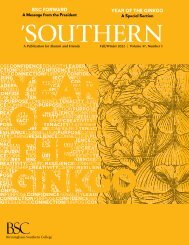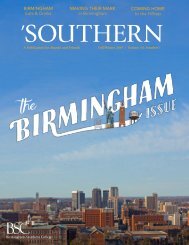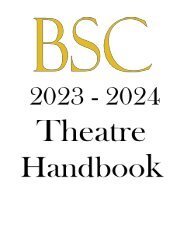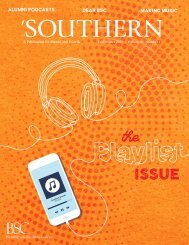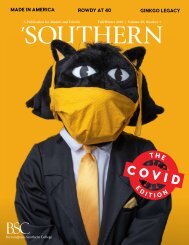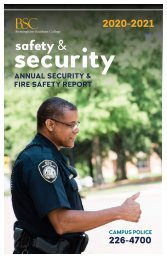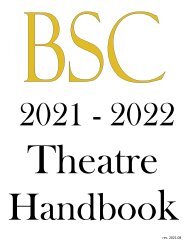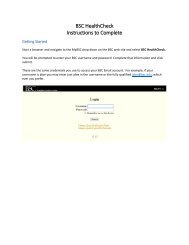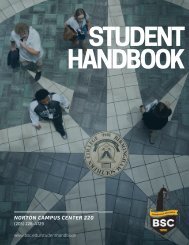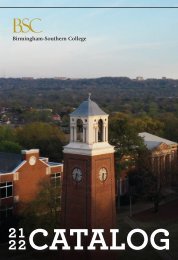Campus Safety Report
Create successful ePaper yourself
Turn your PDF publications into a flip-book with our unique Google optimized e-Paper software.
BSC<br />
Birmingham-Southern College<br />
safety &<br />
security<br />
ANNUAL SECURITY &<br />
FIRE SAFETY REPORT<br />
2022-2023<br />
CAMPUS POLICE<br />
205-226-4700
Foreword<br />
The purpose of this report is to provide the Birmingham-Southern College campus<br />
community, prospective students and their parents, and prospective employees<br />
with general information related to campus safety as required by the “Jeanne<br />
Clery Disclosure of <strong>Campus</strong> Security Policy and <strong>Campus</strong> Crime Statistics Act.”<br />
The report includes statistics of certain incidents occurring on campus, and will<br />
focus on the ongoing commitment of the BSC Administration and <strong>Campus</strong> Police<br />
Department to educate, assist, and inform the community of matters concerning<br />
personal safety.<br />
Contents<br />
General Information 2<br />
<strong>Campus</strong> Police Authority 3<br />
<strong>Report</strong>ing of Incidents 3<br />
Crime Prevention and Awareness 5<br />
Policies 7<br />
<strong>Safety</strong> Tips 8<br />
Statement of Policy Regarding Alcohol and Drugs 8<br />
Statement of Policy Regarding Sexual Assault 10<br />
Statistical <strong>Report</strong> 26<br />
CAMPUS POLICE<br />
205-226-4700<br />
BSC <strong>Campus</strong> Police Receive<br />
National Recognition<br />
According to a 2008 survey by Reader’s Digest,<br />
BSC is the only institution of higher education<br />
in Alabama to receive an “A” safety rating,<br />
and it has been ranked 9th in the nation in safety.
Mission Statement<br />
The Birmingham-Southern College <strong>Campus</strong> Police Department is dedicated to the<br />
goal of maintaining a safe environment while providing the highest level of service<br />
to the campus community.<br />
From The <strong>Campus</strong> Police Chief<br />
Welcome to The Hilltop!<br />
Birmingham-Southern College is proud of its commitment to provide a safe<br />
environment for its students, faculty, staff and friends. Our department is here to<br />
protect you and your property on a twenty-four hour per day, seven day per<br />
week basis.<br />
This annual report will communicate clearly our commitment to provide<br />
Birmingham-Southern with the highest level of safety and service. We want to<br />
educate you on how to help yourself be more aware of your environment and to<br />
minimize the risk of your becoming a victim.<br />
This report reviews not only the statistics of incidents occurring on campus, but<br />
also highlights ways in which you can help protect yourself and your property.<br />
In an era when personal security issues are of keen importance to everyone, we<br />
are proud of our record of service. We look forward to retaining that record<br />
throughout the ensuing year.<br />
Development<br />
Sincerely yours,<br />
Jeff Harris<br />
Chief, <strong>Campus</strong> Police<br />
The BSC Annual Security <strong>Report</strong> is the result of a collaborative effort of individuals<br />
identified as “<strong>Campus</strong> Security Authorities.” Although the primary responsibility<br />
of producing the report rests with the <strong>Campus</strong> Police, the Associate Vice President<br />
for Student Development, the Athletic Director, the Director of Residence Life,<br />
Faculty Advisors to student groups, the Chief of Staff, and the Provost of the<br />
College all contribute to the development of the report. These departmental<br />
leaders are charged with the responsibility of obtaining information on a<br />
scheduled basis from individuals in their respective areas for the purpose of<br />
statistical reporting and for “timely warnings” to the campus community. While<br />
counselors, clergy, health professionals, and clerical staff are not included in the list<br />
of campus security authorities, they are encouraged to make individuals reporting<br />
1
incidents to them aware of their options, which include confidential reporting to the<br />
<strong>Campus</strong> Police. This group is also encouraged to make individuals they are counseling<br />
aware of additional options related to victim’s rights, as they deem appropriate.<br />
The campus community is made aware of the availability of the BSC Annual<br />
Security <strong>Report</strong> in a variety of methods. They receive direct mailings via the BSC<br />
(USPS) campus mail system, and by the various campus media sources. While a<br />
hard copy is not distributed, the exact URL for the electronic version and<br />
information regarding how to receive a hard copy upon request is included in all<br />
notifications. Further, within the first week of the fall semester all incoming<br />
freshmen are briefed on the existence of the report during a mandatory personal<br />
safety session facilitated by the <strong>Campus</strong> Police and members of the Office of<br />
Student Development.<br />
General Information<br />
Birmingham-Southern College employs its own <strong>Campus</strong> Police personnel. The<br />
goal of our 16-person force is to ensure safety and provide service to the campus<br />
community. The <strong>Campus</strong> Police Department operates 24 hours per day, seven days<br />
per week, to provide assistance.<br />
CAMPUS POLICE<br />
205-226-4700<br />
<strong>Campus</strong> Police Phone Number:<br />
205-226-4700<br />
Any incident involving criminal activity, violations of College policies, medical<br />
emergenices, fire or security concerns should be reported to the <strong>Campus</strong> Police<br />
immediately.<br />
The ultimate responsibility for personal safety rests with each individual. Always<br />
be aware of your surroundings and potential risk, know evacuation procedures and<br />
report any security concerns to the <strong>Campus</strong> Police.<br />
The <strong>Campus</strong> Police are always ready to assist you. If you are off campus and have<br />
car trouble, you can call the <strong>Campus</strong> Police for assistance. They will assist to make<br />
arrangements to get you back on campus. If your car battery is dead or your keys<br />
are locked inside your vehicle, the <strong>Campus</strong> Police can assist in most cases.<br />
2
Anyone wishing to be escorted to an on-campus destination should inform the<br />
gate officer upon entering campus, and an officer will meet you.<br />
Escorts are available 24 hours a day through <strong>Campus</strong><br />
Police services. If studying late at night in a classroom<br />
building, call the <strong>Campus</strong> Police for a ride back to your<br />
residence hall.<br />
<strong>Campus</strong> Police Authority/Local Law Enforcement Agreements<br />
<strong>Campus</strong> Police officers have the authority to detain individuals involved in<br />
criminal activity on campus. In the event an incident dictates the need for an<br />
arrest, the Birmingham Police Department will be contacted for assistance. The<br />
Birmingham-Southern College <strong>Campus</strong> Police Department maintains a close<br />
working relationship with the Birmingham Police Department and other law<br />
enforcement agencies.<br />
The campus community is educated throughout the year as to how they should<br />
report criminal incidents, beginning with the written overview mentioned earlier<br />
that is distributed at the beginning of each school year to all faculty, staff, and<br />
students. The various campus media sources, direct mailings, personal safety<br />
programming, the Annual Security <strong>Report</strong>, the Student Handbook, and instructions<br />
from campus security authorities not associated with the <strong>Campus</strong> Police are but a<br />
few of the methods utilized in encouraging individuals to promptly report criminal<br />
incidents to the <strong>Campus</strong> Police. In addition, all incoming freshmen are required<br />
to attend a mandatory session with the BSC Chief of <strong>Campus</strong> Police regarding a<br />
variety of safety and security subjects including the reporting of criminal incidents.<br />
<strong>Report</strong>ing of Incidents<br />
If you become involved in an incident or need to report criminal activity, there are<br />
a number of ways to report incidents or acquire assistance. You can contact the<br />
<strong>Campus</strong> Police by telephone at 205-226-4700 or in person at the <strong>Campus</strong> Police<br />
Office located at the Bruno Entrance. If you wish to report a non-emergency<br />
criminal incident to a campus security authority other than the <strong>Campus</strong> Police,<br />
please see additional suggestions on page 1 under the “Development” section.<br />
There are call boxes at the main entrance of each residence hall. When the<br />
emergency phones are activated, the <strong>Campus</strong> Police know the exact location of the<br />
caller.<br />
3
When an incident is reported to the <strong>Campus</strong> Police, an incident report will be<br />
completed and the matter will be investigated if necessary. Copies of the incident<br />
report are distributed to the Chief of Staff, and the Associate Vice President for<br />
Student Development. These offices, in conjunction with the <strong>Campus</strong> Police,<br />
will determine the final disposition of the matter reported and will recommend<br />
the appropriate action to be taken, including the option of involving outside<br />
police agencies. It should be noted that incidents may be reported confidentially<br />
by request.<br />
Emergency Response/Notifications/Timely Warnings/<br />
Evacuations<br />
In the event an emergency arises on campus that could pose a potentially<br />
dangerous or life threatening situation to the campus community, the <strong>Campus</strong><br />
Police will immediately, as time and the incident allows, initiate the BSC multitiered<br />
system of campus notifications. That system consists of the utilization of<br />
some or all of the following methods: mass notifications via cell phones, text<br />
message, email, portable public address devices, and personal notification. If an<br />
incident as described above occurred, members of the campus community may be<br />
instructed to lock themselves within the rooms they are currently in, or to evacuate<br />
a room, building, a specific area on campus, or remove themselves from the<br />
campus entirely. On an annual basis, the <strong>Campus</strong> Police, working collaboratively<br />
with the BSC Emergency Response Team, tests and practices the College’s<br />
evacuation procedures. During the exercise, The ERT convenes at a pre-determined<br />
location and conducts an enhanced type table-top disaster exercise. In addition to<br />
addressing the scenario, the campus police deploy evacuation route signs, activate<br />
a test of the BSC Alert (Mass Notification) System, and actually work the problem<br />
as if an actual disaster was occurring on campus. The exercise is made public to the<br />
campus community through the Office of Communication (OC). In the event of<br />
an actual disaster, the OC would work with media sources to make the community<br />
at large aware of the matter.<br />
If criminal incidents occur on campus that do not pose an immediate danger to the<br />
community, but the possibility of reoccurring or similar incidents exists, timely<br />
warnings describing those incidents will be made and disseminated to all faculty,<br />
staff, and students.<br />
Emergency assistance is offered for medical emergenices,<br />
fires, and criminal incidents. The <strong>Campus</strong> Police are<br />
always close by for any emergency situation.<br />
4
Crime Prevention And Awareness<br />
The Birmingham-Southern College <strong>Campus</strong> Police Department has a designated<br />
“Crime Prevention Officer” with the responsibility of coordinating the College’s<br />
crime prevention and personal safety efforts. In addition to concerns such<br />
as lighting, vegetation, fire safety and other physical safety issues, the Crime<br />
Prevention Officer is responsible for the development of programs designed to<br />
inform the campus community about campus security procedures, personal safety,<br />
and how to prevent anyone from becoming a victim of crime.<br />
Crime prevention programming is a continually evolving process at Birmingham-<br />
Southern College. In addition to adhering to the concept of “Community<br />
Policing” as an overall strategy in crime prevention, the BSC <strong>Campus</strong> Police remain<br />
cognizant of developing trends and take a “pro-active” approach in modifying<br />
programming needs. Listed below are some of the programs designed to keep<br />
everyone on the Hilltop safe and secure:<br />
• ORIENTATION: Mandatory session for all incoming students regarding<br />
personal safety on and off campus.<br />
• STOP (<strong>Safety</strong> Tips for Office Personnel): A program presented to office<br />
personnel via the campus email system. STOP highlights safety issues associated<br />
with administrative offices.<br />
• OPERATION I.D.: Operation I.D. enables students, faculty, and staff members<br />
to have valuables permanently inscribed by the <strong>Campus</strong> Police, or to borrow an<br />
inscriber and perform the service themselves. The benefits and description of<br />
this program are advertised throughout the year.<br />
• SEMINARS: Seminars are conducted annually for the Housing staff, and on a<br />
routine basis for new employees. Seminars are also conducted throughout the<br />
year upon request for groups in the campus community.<br />
• REMINDERS (Direct emails or Monday Morning): Throughout the year,<br />
information is emailed to students on a variety of subjects including residence<br />
hall safety, vehicle and travel information, personal safety, how to protect one’s<br />
valuables, and fire safety.<br />
• REMINDERS (<strong>Safety</strong> information broadcasted via email): Throughout the year,<br />
safety messages are broadcasted at appropriate times such as before students<br />
leave campus for various breaks in the academic year. Included in these<br />
messages is information making students aware of the <strong>Campus</strong> Police Vehicle<br />
Inspection Service.<br />
• ALCOHOL AWARENESS WEEK: The <strong>Campus</strong> Police, in conjunction with the<br />
offices of Residence Life, the Counseling Services, and Health Services, jointly<br />
sponsor this annual event. The focus of this program is to educate the campus<br />
community concerning issues related to the use of alcohol.<br />
5
Fire <strong>Safety</strong><br />
With regard to fire safety, Birmingham-Southern College takes a comprehensive<br />
and proactive approach to ensuring the safety of its campus residents. Those<br />
efforts are based on a philosophy that results in the College exceeding in<br />
many cases what is required nationally, and locally, in this area. The <strong>Campus</strong><br />
Police Department has a designated officer in the role of Fire Marshal whose<br />
responsibility it is to work closely with the Birmingham Fire and Rescue Service (BF<br />
and RS) in the area of inspections and compliance of national fire standards, and<br />
to maintain campus fire systems.<br />
All campus residential buildings have high quality fire alarm systems that are<br />
monitored by an off campus UE approved monitoring facility that reports to<br />
the BF and RS, and the <strong>Campus</strong> Police, immediately upon the activation of a<br />
fire system. On an annual basis, all campus systems are inspected by a certified<br />
outside contractor, and routinely by the BF and RS Inspection Services Division.<br />
Action items found during these inspections are immediately addressed. On a<br />
weekly basis, the system in each residence hall is checked in person by an officer<br />
to visually ensure that the system is working properly. Also on an annual basis, all<br />
fire extinguishers are inspected and re-certified by an outside contractor.<br />
Fire drills are conducted a minimum of three times annually (Fall, Spring,<br />
Summer). The drills are a joint effort of the BSC Fire Marshal, the Director of<br />
Residence Life, and Residence Life Staff. When one or any of those conducting<br />
the drills feel that the response was slow or inefficient, that building undergoes<br />
subsequent drills until the response is satisfactory. During the drills, complete<br />
evacuation of the building is required.<br />
BSC requires each student that wishes to live in on-campus housing to read and<br />
sign a housing contract that includes specific rules and regulations concerning fire<br />
safety. Open flames (candles, etc.), certain portable electrical devices, and smoking<br />
are examples of items not allowed within the residence halls. A complete list of<br />
allowable items can be viewed at www.bsc.edu/campus/residence/<br />
Throughout the year, fire safety programming is conducted by the <strong>Campus</strong> Police<br />
and the Office of Residence Life.<br />
Fire <strong>Safety</strong> Tips<br />
• Familiarize yourself with building exits and fire extinguisher locations<br />
• When the fire alarm sounds, leave the building immediately<br />
• If a fire is small and containable, immediately activate the building fire alarm if<br />
it is not sounding, and use a fire extinguisher directing the spray at the base of<br />
the flame<br />
• If your exit route contains heavy smoke, stay close to the floor<br />
• If you become trapped in a room, hang something out the window to alert<br />
rescue personnel as to your whereabouts<br />
• Never prop doors open in residence hall hallways or in individual rooms<br />
6
Policies<br />
Bruno Entrance: Access to the campus is monitored 24 hours a day, seven days a<br />
week. Students, faculty, and staff are issued decals to be affixed to the windshield<br />
of their vehicles. Guests of the College are required to sign in with the <strong>Campus</strong><br />
Police before entering the campus.<br />
The College maintains a fence around the campus to define<br />
the College property and limit access. Bruno Entrance is the<br />
only means by which to enter and exit campus.<br />
Building <strong>Safety</strong>: At the end of each business day, <strong>Campus</strong> Police officers secure all<br />
academic and administrative buildings. The buildings are patrolled on a regular<br />
basis until they are reopened the following morning. Persons with a valid reason<br />
for entering an academic building after it has been secured can request assistance<br />
from the <strong>Campus</strong> Police. Valid reasons for entry may include retrieval of personal<br />
items, books, etc., or being inadvertently locked out of the building.<br />
All dormitories at Birmingham-Southern College are locked on a 24 hour a day<br />
basis and are equipped with combination locks. The combinations are given to<br />
residents only by the Office of Residence Life. Combinations are changed on a<br />
monthly basis or as the need arises. Officers patrol the dormitory area 24 hours<br />
a day.<br />
Combination locks on each dorm are provided to allow 24-hour security of<br />
your living facilities.<br />
24-hour security is provided 365 days a year. <strong>Campus</strong> Police officers patrol<br />
campus on foot and in vehicles. <strong>Campus</strong> lighting is designed to provide 24-<br />
hour lighting to all main areas of campus. Inspections of the fire systems in all<br />
living facilities are conducted on a weekly basis.<br />
<strong>Safety</strong> Tips<br />
In Residence Halls:<br />
• Always lock your dorm room, even if you are only gone a brief time.<br />
• Do not prop external doors open; the locks are for your safety. Engrave<br />
valuables; <strong>Campus</strong> Police has an engraver.<br />
• <strong>Report</strong> suspicious people or incidents to <strong>Campus</strong> Police immediately.<br />
In Your Car:<br />
• Always lock your car doors when driving or when you park your car.<br />
• Lock your valuables in the trunk when possible.<br />
• In case of trouble, if someone stops to help, ask for assistance but do not get<br />
out of the vehicle; keep the doors locked and the windows up. If you would<br />
like the fluid levels, tire pressure, and spare tire checked on your vehicle before<br />
traveling, <strong>Campus</strong> Police will be happy to assist you.<br />
7
When You Are On Foot:<br />
• Walk in groups of two or more.<br />
• Walk in well lighted, populated areas.<br />
• Let your roommate or friend know where you are going and when you expect<br />
to return.<br />
Statement Of Policy Regarding Alcohol And Drugs<br />
Birmingham-Southern is committed to an aggressive education program regarding the laws<br />
and effects of the possession, use, or sale of alcohol and/or illegal drugs. In an era when<br />
substance abuse is linked closely with crime and illegal behavior, education is the primary<br />
weapon available to attack this problem. Birmingham-Southern’s <strong>Campus</strong> Police force<br />
works closely with the Office of Student Development and Residence Life staff to conduct<br />
programs aimed at prevention and deterrence of possible abuses. Outlined below are the<br />
College policies regarding these two sensitive areas of student behavior.<br />
ALCOHOL POLICY | THE LAW | THE STATE OF ALABAMA<br />
Alabama Laws Prohibit:<br />
A. Persons under 21 years of age from attempting to purchase, purchasing, consuming,<br />
possessing or transporting alcoholic beverages.<br />
B. Public intoxication as evidenced by boisterous and offensive conduct or endangerment<br />
of self, others or property.<br />
C. Driving while under the influence of alcohol or controlled substances.<br />
D. Unlicensed sale, or possession for sale, of any alcoholic beverages.<br />
THE RULES<br />
Birmingham-Southern College Alcohol Policy:<br />
A. Consumption and distribution of alcohol must be within state laws, local laws, and<br />
College policy. Consumption of alcohol by and distribution of alcohol to those who are<br />
not of legal age is prohibited.<br />
B. The serving, consumption, or possession of alcoholic beverages is prohibited in the<br />
following areas of the campus: the Academic Quadrangle, all buildings in which<br />
regularly scheduled classes are taught, Yeilding Chapel, Norton <strong>Campus</strong> Center, Rush<br />
Learning Center, Phillips Band Building, Stockham Woman’s Building, Geodome, all<br />
areas adjacent to the above enumerated buildings, and at all athletic sites. Consumption<br />
of alcoholic beverages in all other areas must be discreet and inconspicuous and in<br />
conformity with state and local laws. Any alcoholic beverages which are being consumed<br />
in these areas must be in containers which are opaque and which are not identifiable as<br />
holding alcoholic beverages.<br />
C. Public intoxication and/or disruptive behavior related to the consumption of alcoholic<br />
beverages will be considered a violation of this policy.<br />
D. Failure to comply with the directive of a member of the College’s staff in regard to<br />
compliance with this policy will also be considered a violation of this policy.<br />
E. Upon three violations of this policy (a student can accumulate three violations in one<br />
incident) in one academic year, the student may be brought before the Social Council by<br />
the Office of Student Development.<br />
F. A student who has violated the College’s alcohol policy may be required to enter a<br />
program which provides professional help for alcohol abuse.<br />
G. An organization which sponsors an event where alcoholic beverages may be present must<br />
provide non-alcoholic beverages and food at the event.<br />
8
H. There may be no mention or reference to alcohol in the advertisement of any event.<br />
I. For any campus event (at which alcohol may be present), identification (Student I.D.<br />
and/or Driver’s License) will be checked upon entering the building. Only those of legal<br />
age will be permitted to take alcoholic beverages into an event. Reasonable limits will be<br />
set concerning the amount of alcohol an individual will be permitted to bring into the<br />
facility. No glass containers may be taken into an event by anyone.<br />
J. Compliance with the alcohol policy of Birmingham-Southern College is considered to<br />
be part of the student’s obligation under the Code of Student Rights and Responsibilities.<br />
Failure to comply with the policy will be considered to be a violation of that Code and<br />
will result in either a fine being levied and filed in the Office of Student Development or<br />
in the filing of charges with the Social Council.<br />
K. Providing a student I.D. or Driver’s License to another person for purposes of possessing,<br />
purchasing, or consuming alcohol is prohibited.<br />
L. Using or attempting to use a fraudulent or altered Driver’s License or other false form of<br />
identification to possess, purchase, or consume alcohol is prohibited.<br />
M. Beer kegs or large distribution containers are not permitted on campus.<br />
N. Driving under the influence of alcohol on campus may result in, but is not limited to,<br />
the following sanctions.<br />
- The student’s car keys will be confiscated immediately.<br />
- The student must pay a cash fine of $100.00.<br />
- The student must participate in an alcohol program as specified by the Office of<br />
Student Development.<br />
- Failure to submit to an alcohol breath test will result in further disciplinary action.<br />
DON’T DRINK AND DRIVE<br />
Don’t drink and drive. Don’t let a friend drink and drive. If you find yourself in such a<br />
situation, use Uber, Lyft, or call a cab (Yellow Cab, 205-222-2222), or a friend. Don’t drink<br />
and drive.<br />
HEALTH RISKS ASSOCIATED WITH ALCOHOL ABUSE<br />
Psychological and physical addictions, respiratory depression, depression of the immune<br />
system, increased risk of the following: heart disease, cancer, accidents, hypertension,<br />
damage to unborn fetus, risk of impotence, brain damage, possible death at high<br />
dosage levels.<br />
ALCOHOL/DRUG ABUSE-WHERE TO FIND HELP<br />
• BSC Counseling Services 205-226-4717<br />
• Alcoholics Anonymous 205- 290-0060<br />
• Al-Anon and Alateen Information Service 205-322-1500<br />
• Alcohol and Drug Abuse Council 205-933-1213<br />
• The Bradford Center 205-647-1945<br />
• Although Birmingham-Southern College has specific policies regarding drug and alcohol<br />
abuse, the goal of the College is to undertake an educational approach regarding alcohol<br />
and drug abuse.<br />
• The Counseling Services is available to assist you in the areas of alcohol and drug<br />
dependence and abuse.<br />
• The Counseling Services and Health Services Department sponsor annual programs<br />
(Alcohol Drug Awareness Week) and host speakers in the areas of alcohol and<br />
drug abuse.<br />
9
ILLEGAL DRUG POLICY<br />
Possession or use of narcotic, mind-altering or other illicit drugs, except on prescription of<br />
licensed physician, or the sale or distribution of such drugs is prohibited by the College.<br />
Where there is reasonable cause to believe that drug abuse is occurring in College facilities,<br />
such facilities may be entered for investigation at any time and without notice by an official<br />
of the College.<br />
Charges made for possession or unlawful use, or sale or distribution of drugs on campus<br />
will be handled by the Associate Vice President for Student Development. The College may<br />
report to the civil authorities anyone charged with violation of drug laws. In all such cases,<br />
the College will be concerned with the guarantees of legal due process with respect to any<br />
member of the College Community.<br />
When disciplinary action is taken in cases of alleged drug abuse on or off campus, such<br />
action may or may not be concurrent with any action pending by the civil authorities.<br />
The College will cooperate with civil authorities in the enforcement of drug abuse laws on<br />
and off campus.<br />
While the College prohibits the use, possession, or sale of drugs by its students, and<br />
its regulations are consistent with civil laws, the College will undertake an educational<br />
approach with respect to drug abuse. Any student who voluntarily submits himself or<br />
herself or who is referred by others for counsel and help with the problem of drug use, will<br />
be assisted. A student who has violated the College’s illegal drug policy may be required to<br />
enter a program which provides professional help for drug abuse.<br />
Statement Of Policy Regarding Sexual Assault<br />
Educational Programs are presented throughout the academic year on the topic of sexual<br />
assault/date rape. Additionally, the Director of Health Services is available to educate and<br />
consult students on this issue.<br />
What should I do if I have experienced sexual misconduct?<br />
• lf you are in immediate danger on-campus, call campus police (205)226-4700. Dial 911 if<br />
you are off-campus.<br />
• lmmediately seek a safe place.<br />
• Connect with someone you trust for immediate support.<br />
• Preserve all evidence. Do not change your clothing or take a shower. Also, do<br />
not remove items from the area where the incident occurred. Remember that<br />
this is necessary should you decide to pursue this matter in the future.<br />
• If you choose to press criminal charges, you have the option of contacting the<br />
local police.<br />
What are local and campus resources?<br />
• BSC Counseling Services 205-226-4717 On-<strong>Campus</strong>, Norton <strong>Campus</strong> Center 2nd Floor<br />
• BSC Health Services 205-226-4717 On-<strong>Campus</strong>, Norton <strong>Campus</strong> Center 2nd Floor<br />
• YWCA, CentralAlabama 205-322-4878 Off-<strong>Campus</strong><br />
• The Crisis Center, lnc. 205-323-7273 (24-hr hotline) Off-<strong>Campus</strong><br />
What are my options for reporting?<br />
lndividuals have the right to choose whether or not reporting an incident is in their best<br />
interest. The college has professional trained staff to assist as students navigate their options.<br />
The College is dedicated to assisting students regardless of the option the may select.<br />
10
Students may chose more than one of the following options:<br />
• Submit a campus police report<br />
• Submit a report with Birmingham Police Department<br />
• Pursue campus investigation only<br />
• Pursue criminal charges only<br />
• Pursue criminal charges and a campus investigation<br />
• Pursue no investigation<br />
How do I report?<br />
Students may contact the following to file a report:<br />
Dr. David Eberhardt<br />
VP for Student Dev.<br />
205-226-4731<br />
deberhar@bsc.edu<br />
Norton 230<br />
<strong>Campus</strong> Police<br />
205-226-4700<br />
campuspolice@bsc.edu<br />
Student Services 270<br />
Birmingham Police<br />
205-328-9311 or 911<br />
Off <strong>Campus</strong><br />
For information related to sexual assault, relationship violence, and stalking, see the BSC<br />
Website https://www.bsc.edu/_images/StudentHandBookNoDate.pdf<br />
Sexual and Gender-Based Misconduct Policy and Procedures<br />
The College forbids any type of sexual or gender-based misconduct among its students,<br />
faculty, and staff. The College encourages all members of the academic community to report<br />
suspected sexual and gender-based misconduct to the appropriate authorities so that it<br />
can be investigated, remedied, and eliminated. Such misconduct is prohibited whether the<br />
actor is a student, faculty member, staff member, contractor, visitor, or other member of the<br />
College community. BSC forbids retaliation against any person who has opposed, reported,<br />
or participated in an investigation concerning sexual or gender-based misconduct.<br />
Sexual misconduct incorporates a range of behaviors including non-consensual sexual<br />
intercourse, non-consensual sexual contact, sexual exploitation, sexual harassment, intimate<br />
partner violence, stalking, and any other conduct of a sexual nature that is non-consensual,<br />
or has the purpose or effect of creating an intimidating, hostile, or offensive environment,<br />
or unreasonably interferes with an individual’s work and/or academic performance. Genderbased<br />
misconduct encompasses behavior that is not sexual in nature, but is directed at a<br />
person because of their gender or gender identification.<br />
Through this policy and related programs and procedures, Birmingham-Southern College<br />
intends to comply with Title IX of the Education Amendments of 1973 (“Title IX”), Title<br />
VII of the Civil Rights Act of 1964 (“Title VII”), the Jeanne Clery Disclosure of <strong>Campus</strong><br />
Security Policy and <strong>Campus</strong> Crime Statistics Act (“Clery Act”), the <strong>Campus</strong> Sexual Violence<br />
Elimination Act (“SaVE Act”), and the Family Educational Rights and Privacy Act (“FERPA”)<br />
and all regulations implementing these laws.<br />
11
A. Policy Definitions<br />
1. Non-Consensual Sexual Intercourse – Any sexual intercourse (anal, oral, or vaginal),<br />
however slight, with any body part or object by one person (perpetrator) against the<br />
will or without consent of another person (victim).<br />
2. Non-Consensual Sexual Contact – Any intentional sexual touching, however slight,<br />
with any body part or object by one person (perpetrator) against the will or without<br />
consent of another person (victim). Sexual contact includes: intentional contact with<br />
the breasts, buttock, groin, or genitals, or touching another person with any of these<br />
body parts, or making another person touch any of these body parts. Sexual contact<br />
is not limited to these body parts and may include any intentional bodily contact in a<br />
sexual manner.<br />
3. Sexual Exploitation – Behavior that does not constitute one of the other sexual<br />
misconduct offenses, but takes sexual advantage of another person in a non-consensual<br />
or an abusive manner for the benefit or advantage of someone other than the one<br />
being exploited. Sexual exploitation includes but is not limited to: invasion of sexual<br />
privacy, prostituting another individual, non-consensual video or audio-taping of<br />
nudity or sexual activity, going beyond the boundaries of consent (e.g., allowing friends<br />
to hide in the closet to watch consensual sex), engaging in non-consensual voyeurism,<br />
knowingly transmitting an STI or HIV to another student, exposing one’s genitals in<br />
non-consensual circumstances or inducing another to expose their genitals, or genderbased<br />
stalking and/or bullying.<br />
4. Sexual Harassment – Includes unwelcome sexual advances, requests for sexual favors,<br />
and other verbal or physical conduct of a sexual or gender-based (behavior that is<br />
not sexual in nature, but is directed at a person because of their gender or gender<br />
identification) nature when (1) submission to such conduct is made either explicitly<br />
or implicitly a term or condition of an individual’s employment or access to or the<br />
enjoyment of an educational benefit; (2) submission to or rejection of such conduct<br />
is used as a basis for employment or academic decisions or decisions concerning the<br />
educational benefits affecting the individual; or (3) conduct that has the purpose or<br />
effect of unreasonably interfering with an individual’s work or academic performance<br />
or other educational benefit or creating an intimidating, hostile or offensive working,<br />
learning, or living environment. Sexual harassment often occurs when one individual<br />
has actual or apparent authority over another person, such as a faculty member who<br />
can affect a student’s grades, or a supervisor who can affect terms and conditions<br />
of employment of a subordinate. But sexual harassment can occur between two<br />
individuals of any rank or status. For example, it is possible for students to sexually<br />
harass each other, a student to sexually harass a faculty member, and a subordinate<br />
employee to sexually harass the supervisor.<br />
Sexual harassment is absolutely prohibited, whether the harassing individual is a<br />
student, employee, contractor, volunteer, or any other person who benefits from a<br />
relationship with the College.<br />
Examples of sexual harassment include but are not limited to:<br />
• an attempt to coerce an unwilling person into a sexual relationship;<br />
• unwelcome questions about sexual behavior or sexual preference;<br />
• unwelcome verbal conduct such as sexual innuendo, suggestive comments, jokes<br />
of a sexual nature;<br />
12
• unwelcome commentary about an individual’s body, appearance or sexuality<br />
• displaying, distributing, or posting of graphic or sexually suggestive objects,<br />
pictures, cartoons, or graffiti by any means, including but not limited to, computer<br />
networks, cell phones, iPads, or any other electronic device;<br />
• repeatedly subjecting a person to egregious, unwelcome sexual attention;<br />
• suggestive, insulting, or obscene comments or gestures;<br />
• punishing a refusal to comply with a sexual based request;<br />
• conditioning a benefit on submitting to sexual advances;<br />
• sexual or intimate partner violence;<br />
• gender-based stalking;<br />
• gender-based bullying.<br />
5. Intimate Partner Violence – Physical, verbal, emotional, financial, or psychological<br />
abuse (e.g., threats of violence, intimidation) committed by a person who is or has been<br />
in a relationship of a romantic or intimate nature with the victim. The existence of such a<br />
relationship will be determined based on consideration of the length of the relationship,<br />
the type of relationship, and the frequency of interaction between the persons involved<br />
in the relationship.<br />
6. Stalking – A course of conduct directed at a specific person that would cause a reasonable<br />
person to fear for his or her safety or the safety of others or suffer substantial emotional<br />
distress.<br />
B. Understanding Consent<br />
1. Consent – Consent is an essential aspect of any sexual activity. Consent is clear, knowing,<br />
and voluntary. Consent is active, not passive. Silence, in and of itself, cannot be interpreted<br />
as consent. Consent can be given verbally or non-verbally, as long as those words or<br />
actions create mutually understandable, clear permission regarding willingness to engage<br />
in (and the conditions of) sexual activity. Consent to one form of sexual activity does not<br />
imply consent to other forms of sexual activity. Previous relationships or prior consent<br />
does not imply consent to future sexual acts. Consent can be revoked at any time during<br />
a sexual interaction. Consent cannot be obtained through force a or coercion b . A person<br />
who is incapacitated c cannot give consent. In Alabama, the legal age of consent is usually<br />
16 years of age.<br />
a. Force - The use of physical violence and/or imposing on someone physically to gain<br />
sexual access. Force also includes threats, intimidation (implied threats), and coercion b<br />
to overcome resistance or produce consent (e.g. Have sex with me, or I’ll hit you; Have sex<br />
with me, or I’ll post compromising photos of you). Note: There is no requirement that<br />
an individual resist the sexual advance or request, but resistance is a clear demonstration<br />
of non-consent. Sexual activity that is forced is inherently non-consensual, but nonconsensual<br />
sexual activity does not require force.<br />
b. Coercion – Exerting unreasonable pressure for sexual activity. Coercive behavior differs<br />
from seductive behavior based on the type of pressure someone uses to get consent from<br />
another. When someone makes clear that he or she does not want to have sex, that they<br />
want to stop, or that they do not want to go beyond a certain point of sexual interaction,<br />
continued pressure can be coercive.<br />
c. Incapacitation – A person is incapacitated when someone cannot make rational,<br />
reasonable decisions because they lack the capacity to give knowing consent (e.g. to<br />
13
understand the “who, what, where, why or how” of their sexual interaction). Engaging in<br />
sexual activity with someone who is known (or one should have known) to be mentally or<br />
physically incapacitated due to mental disability, involuntary physical restraint, alcohol<br />
or drugs, unconsciousness, sleep, or blackout constitutes a violation of this policy.<br />
C. Related Behaviors Representing Violations of the Sexual Misconduct Policy<br />
1. Attempted Sexual Misconduct – An attempt to commit an act of sexual misconduct is<br />
considered a violation of the sexual misconduct policy.<br />
2. Aiding Sexual Misconduct – Providing aid to someone attempting to or engaging in an<br />
act of sexual misconduct is considered a violation of the sexual misconduct policy.<br />
3. Retaliation – Taking an action against a person who has opposed sexual misconduct,<br />
reported sexual misconduct, or participated in an investigation concerning sexual<br />
misconduct. Retaliation can include physical violence, threats, intimidation or coercion;<br />
adverse employment or educational actions (such as demotion, discharge, giving an<br />
unwarranted bad grade); or increasing or intensifying a pattern of sexual misconduct.<br />
An act of retaliation toward any person who has opposed, reported, or participated in<br />
an investigation of sexual misconduct is prohibited and will be subject to disciplinary<br />
action, up to and including immediate expulsion or discharge.<br />
4. Malicious <strong>Report</strong>ing – Submitting a false report of sexual misconduct with the intent of<br />
causing emotional, psychological, educational, or other harm to another person. A Sexual<br />
Misconduct Hearing Board (described below in F.6 and H) finding of “Not in Violation”<br />
regarding the sexual misconduct policy is not sufficient evidence to demonstrate that a<br />
report was malicious or that a violation did not occur. A finding of this nature simply<br />
indicates the Board felt there was not enough evidence to find a person in violation.<br />
D. Overview of <strong>Report</strong>ing and Support Resources<br />
1. Filing an Official <strong>Report</strong> of Sexual Misconduct<br />
The following list provides an overview of the primary resources authorized to receive<br />
and investigate official reports of sexual misconduct. A more comprehensive overview<br />
of the reporting process is detailed later in the policy.<br />
14
Alleged Victim or Target <strong>Campus</strong> Entity Contact Info<br />
of Sexual Misconduct<br />
Student, Faculty, Staff, or Guest <strong>Campus</strong> Police 205-226-4700<br />
campuspolice@bsc.edu<br />
Student Services 270<br />
Faculty or Staff<br />
Vanessa Crawford<br />
Jones, Assistant<br />
Director of<br />
Human Resources<br />
205-226-4644<br />
vdcrawfo@bsc.edu<br />
Munger 309<br />
Faculty or Staff Lane Estes, 205-226-4641<br />
Vice President of lestes@bsc.edu<br />
Administration<br />
Munger 213<br />
Student, Faculty, Staff, or Guest<br />
David Eberhardt, 205-226-4731<br />
Title IX Coordinator deberhar@bsc.edu<br />
VP for Student<br />
Munger 230<br />
Development<br />
Any of the individuals identified above can assist an individual in filing a report;<br />
however, in situations where there is an imminent threat of bodily harm, please contact<br />
<strong>Campus</strong> Police (205-226-4700) immediately for assistance.<br />
Individuals have the right to file a criminal complaint with law enforcement officials,<br />
regardless of their decision about taking advantage of the College’s adjudicatory process<br />
for sexual misconduct. <strong>Campus</strong> Police can assist with filing police report with local<br />
authorities. If you would prefer to contact Birmingham Police directly to file a report,<br />
the non-emergency phone number is 205-328-9311.<br />
1. Confidential Support Resources<br />
For those individuals seeking confidential support, the following on-campus and offcampus<br />
resources are available. These resources may assist an individual in filing an<br />
official report through the means detailed above, but they are under no obligation to<br />
report incidents of sexual misconduct nor are they authorized to receive or investigate<br />
reports of sexual misconduct.<br />
15
Support Resource Contact Info Location<br />
hloe Ballard<br />
Counseling Services<br />
Yvette Spencer,<br />
Health Services<br />
205-226-4727<br />
ckballard@bsc.edu<br />
205-226-4717<br />
yspence@bsc.edu<br />
On-<strong>Campus</strong>,<br />
Norton <strong>Campus</strong> Center, 2 nd Floor<br />
On-<strong>Campus</strong>,<br />
Norton <strong>Campus</strong> Center, 2 nd Floor<br />
Rev. Julie Holly, 205-226-4761 On-<strong>Campus</strong>,<br />
College Chaplain jholly@bsc.edu Norton <strong>Campus</strong> Center, Suite 120<br />
YWCA, 205-322-4878 Off-<strong>Campus</strong>,<br />
Domestic Violence Svcs. (24-hour hotline) 309 23 rd Street North,<br />
Central Alabama Birmingham, AL, 35203<br />
www.ywcabham.org/enddomestic-violence<br />
Rape Response, 205-323-7273<br />
Services<br />
(24-hour hotline)<br />
The Crisis Center, Inc.<br />
Off-<strong>Campus</strong>,<br />
3620 8th Ave S, Birmingham, AL,<br />
35222<br />
www.crisiscenterbham.com/<br />
rape-response.php<br />
1. Additional <strong>Campus</strong> Resources<br />
Any other employee of the College not listed above may also serve as a resource for<br />
students or fellow employees. For example, students may wish to speak with a faculty<br />
advisor or coach who they believe will provide meaningful support. However, all<br />
employees other than those listed as a Confidential Support Resource must relay the<br />
information they receive regarding possible sexual misconduct with the appropriate<br />
official designated in D.1.<br />
A. <strong>Report</strong>ing: When a Student is Subjected to Sexual Misconduct<br />
Any person may make an official report that a student has been subjected to sexual<br />
misconduct. A report may be made by the student who believes that she or he is the<br />
target or victim of sexual misconduct, or by a person who witnesses or hears about an<br />
incident of sexual misconduct toward a student. A reporting person may file a report with<br />
one of the designated officials listed in D.1. A report may initially be filed by sending an<br />
email, calling, or coming to the appropriate office to see designated College personnel.<br />
An official report will likely involve both a meeting with College personnel, as well as a<br />
written statement by the reporting person and the suspected target or victim.<br />
1. Mandatory <strong>Report</strong>ers – College employees are considered “responsible employees,”<br />
and have a duty and a responsibility to act when notified of an alleged incident of<br />
sexual misconduct by relaying that information to one of the designated officials<br />
listed in D.1. <strong>Report</strong>s of sexual misconduct will be handled with discretion, and the<br />
information reported will be shared only with those necessary, including investigators<br />
and witnesses, as well as the accused student (“respondent”) if a full investigation is<br />
initiated.<br />
16
2. Confidentiality – An investigation, hearing, appeal, and reconsideration of any sexual<br />
misconduct violation in which the target or victim of misconduct is a student shall<br />
remain confidential. Those defined herein as within the bounds of confidentiality<br />
may not divulge anything that is said or done throughout the conduct process. Not all<br />
parties within the bounds of confidentiality are informed of every sexual misconduct<br />
matter; however, those bound by confidentiality include Sexual Misconduct Hearing<br />
Board members, <strong>Campus</strong> Police, Advisors, the Dean of Students, the Vice President for<br />
Student Development, the Provost, the Director of Human Resources, the Chief of Staff,<br />
and the President, and when appropriate or necessary, legal counsel for the College.<br />
Should anyone outside the bounds of confidentiality receive information which is<br />
considered to be confidential, he or she will automatically be bound by confidentiality.<br />
In addition, the target or victim of misconduct or respondent may include with the<br />
bounds of confidentiality his or her parents, faculty, staff, minister or spiritual advisor,<br />
personal or legal counsel. Should anyone within the bounds of confidentiality violate<br />
the requirement of confidentiality, the Dean of Students may elect to pursue charges<br />
for failing to comply with directives regarding confidentiality. The College will respect<br />
the request of a student not to disclose his or her identity to the extent possible while<br />
still complying with its obligations to protect the College community as a whole<br />
against sexual misconduct and discrimination. If the alleged victim demands absolute<br />
confidentiality, the Title IX Coordinator will determine how the College will respond to<br />
meet its responsibilities to both the alleged victim and the College community.<br />
3. Confidential <strong>Report</strong>ers – If a student would like to speak with someone at the College<br />
confidentially when no further reporting of the incident will necessarily occur, options<br />
include a personal counselor or health professional in Counseling and Health Services,<br />
as well as the College’s Chaplain.<br />
4. Limitations of College Authority – The College will not investigate or adjudicate<br />
alleged student conduct that occurs off campus when the alleged victim is not a College<br />
student, employee, or other member of the College community (such as a contractor<br />
or volunteer). If the College learns of such conduct, the College may report allegations<br />
of such conduct to law enforcement authorities or other educational institutions. In<br />
addition, the College may be limited in its ability to take remedial action involving an<br />
alleged perpetrator who is not a student or employee. In such instances, the College<br />
will support the alleged victim with College resources (which may include removal and<br />
banning of the suspected individual from campus) and refer alleged victims to other<br />
entities which may provide support or initiate criminal prosecution.<br />
5. Interim Measures – In order to minimize disruption to the alleged victim’s educational<br />
experience, interim measures may be put in place. An official report does not have to<br />
be made for interim measures to be initiated. The College will make necessary changes<br />
to the academic, living, transportation, and working situations of any alleged victim if<br />
requested and reasonably available, whether or not the alleged victim chooses to make<br />
an official report to campus officials or local law enforcement.<br />
Interim measures include, but are not limited to:<br />
• Access to Counseling Services and assistance in setting up initial appointments<br />
• No contact directives<br />
• Change in class schedule, including the ability to drop a course without penalty or<br />
to transfer sections, as well as changes in the class schedule of individuals alleged to<br />
have engaged in sexual misconduct<br />
17
• Rescheduling of exams or assignments<br />
• Providing alternative course completion options<br />
• Change in work schedule or job assignment<br />
• Housing reassignment<br />
• Adjustments to dining arrangements<br />
• Assistance from College support staff in completing housing relocation<br />
• Limiting respondent’s access to certain College facilities or activities pending<br />
investigation and/or hearing outcome<br />
• Interim suspension for the respondent<br />
6. Safe Haven – Students who seek assistance as a result of experiencing sexual misconduct<br />
are not subject to sanction by a College authority for being in violation of College<br />
policy related to alcohol, illegal drugs, or other policies at the time of the alleged sexual<br />
misconduct.<br />
B. Remedial Procedures When a Student is Accused of Sexual Misconduct:<br />
Investigation, Conduct Meetings or Hearings, and Related Matters<br />
1. Time Frame – Once an initial complaint regarding sexual misconduct has been received<br />
by College officials, the Dean of Students will move forward with investigating and<br />
resolving the matter as promptly as reasonably possible. The circumstances of the alleged<br />
incident(s) will determine the timeframe within which all individuals involved, including<br />
all relevant witnesses, can be contacted and meetings held. Generally, the investigative<br />
phase can be expected to be completed within two weeks to one month from the initial<br />
report of the incident, exclusive of any significant breaks in the academic calendar. In<br />
addition, coordinating all individuals necessary for participation in hearings may require<br />
an extended timeframe. However, hearings, deliberations, and decisions will typically be<br />
completed within two weeks to one month of the conclusion of the investigative phase<br />
and charges being determined, dependent upon the timing within the academic calendar.<br />
Appeals will usually require one week to one month for a final decision, depending<br />
on whether the matter is referred to a committee and the timing within the academic<br />
calendar.<br />
2. Investigation Procedures – Once a report has been made, the Dean of Students will<br />
conduct a preliminary investigation (e.g. reviewing any <strong>Campus</strong> Police reports, meeting<br />
with the alleged victim, etc.) to determine whether the information provided indicates<br />
reasonable cause of a sexual misconduct policy violation. If reasonable cause exists, the<br />
Dean of Students will conduct a full investigation using information from the preliminary<br />
investigation, obtaining a statement from the respondent, and interviewing relevant<br />
witnesses. When the investigation is complete, the Dean of Students will either refer the<br />
matter to the Sexual Misconduct Hearing Board (the preferred option) or the matter may<br />
be handled through an Administrative Conduct Meeting if both the person believed to<br />
have been the target or victim of misconduct and the respondent agree to that option. In<br />
matters that do not involve sexual or intimate partner violence, informal resolution may<br />
be explored as well. The person believed to be the target or victim of sexual misconduct<br />
may choose at any time not to participate in the investigation or disciplinary process.<br />
If the Dean of Students believes there is sufficient evidence to form a belief that sexual<br />
misconduct occurred, and that action is necessary to protect any member of the College<br />
community from possible additional sexual misconduct, the Dean of Students may<br />
proceed with the investigation or hearing process.<br />
18
Because the College’s obligation to protect its community members from sexual<br />
misconduct exists independently of the criminal justice system, the investigatory and<br />
hearing procedures (if applicable) will continue notwithstanding any related criminal<br />
proceedings. The College may briefly delay its response if necessary to avoid interference<br />
with a law enforcement investigation.<br />
3. Advisor – The alleged target or victim of misconduct and respondent are offered advisors<br />
once a complaint enters the investigation phase (though one can be requested earlier).<br />
The advisor provides support and guidance through the investigation and hearing process.<br />
The advisor should be a willing member of the BSC community, although exceptions<br />
may be granted by the Vice President for Student Development (e.g., a Crisis Center staff<br />
member or volunteer). Additionally, upon request, an advisor can be appointed from the<br />
Sexual Misconduct Hearing Board pool.<br />
4. Standard of Evidence – When determining if a violation of the sexual misconduct<br />
policy has occurred, the standard of evidence to be used by any conduct authority is<br />
preponderance of evidence. Preponderance of evidence indicates that a violation is more<br />
likely than not to have occurred.<br />
5. Administrative Conduct Meeting – If both the alleged target or victim of misconduct and<br />
respondent request to have an incident of sexual misconduct handled administratively,<br />
the Dean of Students will render a decision as to whether the respondent violated<br />
the sexual misconduct policy and assess sanctions if required. If the complainant and<br />
respondent accept the findings/sanctions of the Dean of Students, the matter will be<br />
closed. If not, the matter will be referred to the Sexual Misconduct Hearing Board.<br />
6. Sexual Misconduct Hearing Board – The Dean of Students may refer an investigation<br />
to the Sexual Misconduct Hearing Board (“the Board”), comprised of faculty, staff, and<br />
students from a pool of trained Board members. The Board is a three or five member<br />
panel that consists of a minimum of one student, one staff member, and one faculty<br />
member. When a five member panel is called, a minimum of two students should serve<br />
on the board. The Board will hear the results of the Dean’s investigation along with<br />
the testimony from relevant witnesses including the alleged target or victim of sexual<br />
misconduct and respondent, and review any other appropriate materials. They will<br />
reach decisions regarding violations and sanctions, as appropriate. Details regarding the<br />
procedures of the Board are outlined below.<br />
Sexual Misconduct Hearing Board Procedures<br />
The procedure for a hearing will be as follows:<br />
1. The Vice President of Student Development serves as convener and chair. The chair<br />
participates in the hearing but does not vote on the hearing outcomes.<br />
2. A three or five member panel is selected from the Sexual Misconduct Hearing Board pool.<br />
The Board will consist of a minimum of one student, one staff member, and one faculty<br />
member. When a five member panel is called, a minimum of two students should serve<br />
on the board.<br />
3. The Dean of Students will serve as the presenter. The presenter presents information<br />
gathered during the investigation, but does not recommend sanctions.<br />
19
4. Due to the sensitive nature of these hearings, the alleged victim or target of sexual<br />
misconduct and respondent may be kept separate throughout the hearing, appearing<br />
before the Board at designated times but able to hear all statements made within the<br />
hearing.<br />
5. No witness, other than the respondent or alleged victim or target of sexual misconduct,<br />
if he/she chooses to testify, will be allowed to hear the testimony of other witnesses.<br />
6. Before testifying, each student witness will be reminded that their statements are bound<br />
by the Honor Code, and employee witnesses will be reminded that their testimony is<br />
expected to be truthful under penalty of termination of employment.<br />
7. The Board will call witnesses, consider relevant information, and question the respondent<br />
and alleged victim until it has exhausted every reasonable method of ascertaining the<br />
facts.<br />
8. The Board will not consider the respondent’s past findings of violations of the Honor<br />
code or Social Regulations in determining whether the respondent has violated Social<br />
Regulations or Sexual Misconduct Policies. Such evidence may be considered in<br />
determining sanctions.<br />
9. An attorney may be present during the hearing. The attorney may speak to the person<br />
represented by the attorney, but may not address directly anyone else involved in the<br />
hearing other than the Chair. Any comments or questions an attorney has should be<br />
directed to the Chair of the Board in a private conversation.<br />
10. The Board must act with complete impartiality. A Board member may be excused from<br />
a case in which personal involvement may constitute a conflict of interest. Additionally,<br />
Board composition will be shared with the reporting party and respondent at least 72<br />
hours in advance of the hearing. Either party may request a member of the Board be<br />
removed.<br />
11. The respondent is considered not to have violated any policy throughout the hearing until<br />
there is a finding that a violation has occurred. The standard of proof is a preponderance<br />
of evidence that a violation occurred. The finding must be supported by a majority<br />
vote of the Board.<br />
12. As the conduct authority for issues of sexual misconduct, the Board has the authority<br />
to issue sanctions according to the guidelines outlined in the Student Handbook<br />
(pp. 16-17).<br />
Rights of the Alleged Victim and Respondent<br />
The alleged victim and the respondent have the following rights:<br />
1. The alleged victim and respondent will be notified in writing of a hearing at least 72<br />
hours prior to the hearing. This time period may be shortened upon the agreement of the<br />
both parties and the Board (“Chair”).<br />
2. The alleged victim and respondent may select any willing student, faculty member, or<br />
staff member of Birmingham-Southern College to serve as his or her advisor. Additionally,<br />
upon request, an advisor may be appointed from the Sexual Misconduct Hearing<br />
Board pool.<br />
20
3. The alleged victim and respondent are not required to appear at the hearing. If either<br />
person fails to attend, the hearing will proceed and evidence presented as if both parties<br />
were present.<br />
4. The alleged victim and respondent have the right to be present throughout the hearing<br />
except during the Board’s deliberations. Presence may be limited to hearing testimony<br />
remotely through telephone or similar aid of technology.<br />
5. The alleged victim’s sexual history will not be discussed during the hearing unless it relates<br />
to the respondent and is determined by the Chair to be highly relevant to the alleged<br />
misconduct.<br />
6. The alleged victim and respondent may call relevant witnesses to speak on his or her behalf.<br />
Requests should be made to the Chair in writing so that notice can be given for any<br />
witness requested to appear.<br />
7. The alleged victim and respondent may address the Board during his or her appearance<br />
before the Board.<br />
8. The alleged victim and respondent may hear the statements of all witnesses called and<br />
question them. To avoid an adversarial dynamic, the alleged victim and respondent may<br />
only directly question those witnesses called on his or her behalf. For all other witnesses,<br />
questions may be submitted to the Chair prior to and during the hearing. Those questions<br />
will be reviewed for relevancy by the Board, amended as deemed appropriate, and asked<br />
by the Chair.<br />
9. The alleged victim and respondent may each call one or two character witnesses to speak<br />
upon his or her behalf.<br />
10. In cases that involved multiple respondents, the Board will arrive at an independent<br />
decision for each respondent.<br />
11. The alleged victim and respondent will be notified of the hearing outcome.<br />
12. The alleged victim and respondent may appeal the decision of the Board to the President<br />
in accordance with the Appeal section outlined below.<br />
13. Both the alleged victim and respondent will be notified in writing of the potential<br />
charges; date and time of hearing proceedings; hearing board composition; the outcomes<br />
and/or any changes to the outcomes (e.g., hearing decision, hearing sanctions, interim<br />
measures); and any subsequent appeal.<br />
Appeal<br />
1. A respondent or alleged victim may appeal the finding of the Board in writing to the<br />
President of the College within five class days of the decision or before the last day of the<br />
term, whichever comes first. The President may review the case personally or appoint a<br />
committee to review the case.<br />
2. An appeal is limited to a review of the full report of the Board, including the hearing<br />
transcript, for the purpose of determining whether it acted in accordance with procedural<br />
and substantive fairness. An appeal on the basis of substantive fairness may not contest<br />
21
the factual findings of the Board but is limited on the basis of the fundamental fairness<br />
of the penalty or the application of the standards of the Sexual Misconduct Policy.<br />
3. An appeal in which the finding of the Board is reversed may be remanded to the Board<br />
for rehearing with a written opinion or directive of the President.<br />
4. An appeal by the respondent may not result in a more severe penalty for the respondent;<br />
however, an appeal by the alleged victim may result in a more severe penalty for the<br />
respondent. In both circumstances, reversal of the finding and/or modification of the<br />
sanction may occur without rehearing by the Board.<br />
C. Remedial Procedures When an Employee is Accused of Sexual Misconduct: Investigation,<br />
Recommended Outcomes, Hearings, and Related Matters<br />
The Director of Human Resources will be notified of all reports of sexual misconduct directed<br />
toward an employee. In all cases, except when the person suspected of engaging in misconduct<br />
is a student, the Director will assess each such situation by holding fact finding conferences<br />
and obtaining statements from employees. In any situation in which the Director of Human<br />
Resources is accused of violating this policy, the Chief of Staff or another person designated<br />
by the Chief of Staff will fulfill the role of the Director of Human Resources.<br />
The Director of Human Resources will report findings to the Provost (if the accused is a faculty<br />
member) or to the appropriate Vice President (if the accused is not a faculty member) and<br />
make a recommendation concerning further action and disposition of the matter.<br />
After reviewing all the evidence, the Provost or the appropriate Vice President, in consultation<br />
with the Director of Human Resources, will make a determination whether reasonable<br />
grounds exist to believe that sexual misconduct has occurred. If such grounds are found to<br />
exist, the Provost or appropriate Vice President will take all appropriate action to eliminate<br />
such conduct and impose appropriate discipline. In any situation in which the Provost or<br />
appropriate Vice President is accused of violating this policy, the President of Birmingham-<br />
Southern College will fulfill that role. In any situation in which the President of the College<br />
is accused of violating this policy, the Director of Human Resources, in consultation with the<br />
Chairperson of the Board of Trustees will fulfill that role.<br />
If either the employee accused of engaging in sexual misconduct or the person who is believed<br />
to have been the target or subject of sexual misconduct is dissatisfied with the action taken<br />
by the Provost or Vice President, the person may appeal the decision to a Sexual Misconduct<br />
Hearing Board. If the accused person is a faculty member, the Board will consist of a three<br />
faculty member panel, selected by the Provost from a pool of trained Board members who<br />
have been appointed by the Chair of the Faculty Advisory Committee. If the accused person<br />
is a staff member, the Board will consist of three staff members from a pool of trained Board<br />
members appointed by the Director of Human Resources.<br />
If either the employee accused of engaging in sexual misconduct or the person who is believed<br />
to have been the target or subject of sexual misconduct is dissatisfied with the action taken by<br />
the Sexual Misconduct Hearing Board, the person may appeal the decision to the President<br />
in writing within 21 days after the Board’s determination is communicated to the person. The<br />
other party will have 21 days to respond in writing to the appeal, and the President will make<br />
the final determination based upon the record before the Board and the written submissions<br />
of the accused and the person who is believed to have been the target or subject of sexual<br />
22
misconduct.<br />
Because the College’s obligation to protect its community members from sexual misconduct<br />
exists independently of the criminal justice system, the investigatory and hearing procedures<br />
(if applicable) will continue notwithstanding any related criminal proceedings. The College<br />
may briefly delay its response if necessary to avoid interference with a law enforcement<br />
investigation.<br />
Advisor – The alleged victim and respondent may be assisted throughout the process by<br />
advisors. The advisor may provide support and guidance through the investigation and<br />
hearing process. The advisor should be a member of BSC community, although exceptions<br />
may be granted by the Provost or appropriate Vice President (e.g., a Crisis Center staff member<br />
or volunteer). Additionally, upon request, an advisor can be appointed from the Sexual<br />
Misconduct Hearing Board pool.<br />
Employee Sexual Misconduct Hearing Board Procedures<br />
In a proceeding before the Sexual Misconduct Hearing Board, the following procedures will<br />
apply:<br />
1. The Director of Human Resources serves as convener. The senior member of the panel<br />
will serve as chair.<br />
2. A three-member panel of faculty or staff members is selected from the Board pool.<br />
3. The Director of Human Resources or his or her designee will serve as the presenter. The<br />
presenter presents the information gathered during the investigation.<br />
4. Due to the sensitive nature of these hearings, the alleged victim and respondent may be<br />
kept separate throughout the hearing, appearing before the Board at designated times but<br />
able to hear all statements within the hearing.<br />
5. No witness, other than the alleged victim or respondent if either chooses to testify, will<br />
be allowed to hear the testimony of other witnesses.<br />
6. Before testifying, each employee witness will be reminded that his or her testimony is<br />
expected to be truthful under penalty of termination of employment, or if the witness is<br />
a student, subject to the Honor Code.<br />
7. The Board will call witnesses, consider relevant information, and question the respondent<br />
and alleged victim until it has exhausted every reasonable method of ascertaining<br />
the facts.<br />
8. An attorney may be present during the hearing. The attorney may speak to the person<br />
represented by the attorney, but may not address directly anyone else involved in the<br />
hearing other than the Chair. Any comments or questions an attorney has should be<br />
directed to the Chair of the Board in a private conversation.<br />
9. The Board must act with complete impartiality. A Board member may be excused from<br />
a case in which personal involvement may constitute a conflict of interest. Additionally,<br />
Board composition will be shared with the alleged victim and respondent at least 72 hours<br />
in advance of the hearing. Either party may request a member of the Board be removed.<br />
23
10. The respondent is considered not to have violated any policy throughout the hearing until<br />
there is a finding that a violation has occurred. The standard of proof is a preponderance<br />
of evidence that a violation occurred. The finding must be supported by a majority vote<br />
of the Board.<br />
Rights of the Alleged Victim and Respondent<br />
The reporting party and respondent will be afforded the following rights:<br />
1. The alleged victim and respondent will be notified in writing of a hearing at least 72<br />
hours prior to the hearing. This time period may be shortened upon the concurrence of<br />
the both parties and the Chair.<br />
2. The alleged victim and respondent are not required to appear at the hearing. If either<br />
person fails to attend, the hearing will proceed and evidence presented as if both parties<br />
were present.<br />
3. The alleged victim and respondent have the right to be present throughout the hearing<br />
except during the Board’s deliberations. Presence may be limited to hearing testimony<br />
remotely through telephone or similar aid of technology.<br />
4. The alleged victim’s sexual history will not be discussed during the hearing unless it<br />
relates to the respondent and is determined by the Chair to be highly relevant to the alleged<br />
misconduct.<br />
5. The alleged victim and respondent may select any willing student, faculty member, or<br />
staff member of Birmingham-Southern College to serve as his or her advisor. Additionally,<br />
upon request, an advisor may be appointed from the Sexual Misconduct Hearing<br />
Board pool.<br />
6. The alleged victim and respondent may call relevant witnesses to speak on his or her behalf.<br />
Requests should be made to the Chair in writing so that notice can be given for any<br />
witness required to appear.<br />
7. The alleged victim and respondent may address and question the Board during his or her<br />
appearance before the Board.<br />
8. The alleged victim and respondent may hear the statements of all witnesses called and<br />
question them. To avoid an adversarial dynamic, the alleged victim and respondent may<br />
only directly question those witnesses called on his or her behalf. For all other witnesses,<br />
questions may be submitted to the Chair prior to and during the hearing. Those questions<br />
will be reviewed for relevancy by the Board, amended as deemed appropriate, and<br />
asked by the Chair.<br />
9. The alleged victim and respondent may call one or two character witnesses to speak upon<br />
his or her behalf.<br />
10. In cases that involved multiple respondents, the Board will arrive at an independent decision<br />
for each respondent.<br />
11. Both the alleged victim and respondent will be notified in writing of the potential charges;<br />
date and time of hearing proceedings; hearing board composition; and the outcomes<br />
24
and/or any changes to the outcomes (e.g., hearing decision, disciplinary action, interim<br />
measures); and any subsequent appeal.<br />
D. Sexual Misconduct Hearing Board<br />
As noted in the policy above, the Sexual Misconduct Hearing Board will often hear cases<br />
regarding alleged violations of this policy. The Board is comprised of the following<br />
members, selected and appointed as outlined below:<br />
- Students: Five or more returning members from the previous year’s Honor Council are<br />
selected by the Title IX Coordinator in consultation with the Dean of Students.<br />
- Faculty: Five or more faculty members will be appointed by the Chair of the Faculty<br />
Advisory Committee in consultation with the Provost, the Title IX Coordinator, and the<br />
Director of Human Resources.<br />
- Staff: Five or more staff members from across the various administrative departments of<br />
the College will be appointed by the Director of Human Resources in consultation with<br />
the Title IX Coordinator and the Dean of Students.<br />
Each year, new members of the Board will undergo training in the various tenets of the Sexual<br />
Misconduct Policy and procedures employed to investigate and hear allegations regarding<br />
possible violations. In addition, continuing members of the Board will attend review<br />
sessions to ensure they remain aware of any changes to the Policy and are prepared to serve<br />
when called upon. Emphasis will be placed upon protection of confidentiality, appropriate<br />
and relevant questioning, effective deliberation, reaching conclusions, and other vital topics<br />
in all training and review sessions for the Board..<br />
Missing Student<br />
In the event circumstances lead an individual to suspect that a BSC student is<br />
missing, the matter should be reported as soon as possible to the <strong>Campus</strong> Police<br />
(ext. 4700), and/or the Office of Student Development (ext. 4722). When an<br />
incident of this type is reported, officials within the above listed departments shall<br />
immediately initiate an investigation (at BSC, prior to a 24‐hour period), and the<br />
circumstances of the matter will be outlined in an official <strong>Campus</strong> Police report.<br />
Specifically, initial efforts may include, but are not limited to, the following:<br />
• Calling cell phone number provided by student<br />
• Checking the person’s on campus assigned residence for their presence or<br />
evidence<br />
• Speaking with the person’s known friends or Greek affiliate, when applicable<br />
• Determining if the person owns a vehicle, and if that vehicle is on the physical<br />
campus<br />
• Reviewing online sources such as Facebook<br />
• Consulting academic instructors, counselors, and advisors<br />
• Attempting to determine if there have been similar incidents with the student<br />
• Contacting the student’s designated confidential contact, when appropriate<br />
25
If the student has not been located within a 24-hour period or sooner, and<br />
if circumstances dictate, the BSC <strong>Campus</strong> Police will report the matter to the<br />
Birmingham Police Department for additional assistance.<br />
Each fall, the Office of Student Development shall make students living in<br />
an on-campus housing facility aware that they have the option to register a<br />
confidential contact person to be notified in the case the student is determined<br />
to be missing, and that only authorized campus and law enforcement officials<br />
in proceeding with a missing person investigation may have access to this<br />
information. While not required by law, non resident students (Commuters) will<br />
be given this opportunity as well, and will receive similar treatment in terms of<br />
investigating the matter.<br />
The Office of Student Development shall make all students aware that in the event<br />
they choose not to identify a confidential contact, that law enforcement officials<br />
will be notified any time a student is reported missing. Further, the Office of<br />
Student Development shall make all students less than 18 years of age, unless they<br />
are legally emancipated from their parents or legal guardians, aware that in all cases<br />
their parents or legal guardians will be notified with or without their permission.<br />
Confidential/Emergency contact information will be gathered and maintained in<br />
the Office of Student Development.<br />
Birmingham-Southern College retains the right to contact the parents or legal<br />
guardians of any student when, in the opinion of campus administrators,<br />
communication is a result of extreme circumstances and vital to the protection<br />
of life.<br />
26
Birmingham-Southern College Statistical <strong>Report</strong><br />
The following statistics are based on specific incidents reported to BSC security<br />
authorities that include the BSC <strong>Campus</strong> Police, Vice President for Student<br />
Development, Athletic Director, Faculty Advisors to student groups, and the<br />
Director of Residence Life. The statistics reflect reported incidents only, and do<br />
not necessarily indicate whether the incident was confirmed through an<br />
investigation or administrative action. For example, if an individual reported<br />
an incident confidentially, the incident could conceivably be counted as a<br />
statistic without being investigated. Due to the entire campus of Birmingham-<br />
Southern College being surrounded by a perimeter fence, there are no public<br />
streets, sidewalks, thoroughfares, or parking facilities accessible from the<br />
campus. Therefore, the following statistics are a compilation of incidents<br />
occurring on the BSC campus and are divided geographically by where they<br />
were reported to have occurred.<br />
A log of incidents occurring on campus is available for public viewing in the<br />
<strong>Campus</strong> Police office on a daily basis between the hours of 8:15 A.M. and 4:45<br />
P.M., Monday through Friday.<br />
Overall <strong>Campus</strong> Statistics 2020 2021 2022<br />
Criminal Homicide, Murder and 0 0 0<br />
Non-Negligent Manslaughter<br />
Negligent Manslaughter 0 0 0<br />
Rape 0 1<br />
Fondling 0 0 1<br />
Incest 0 0 0<br />
Non-Forcible<br />
Statutory Rape 0 1 1<br />
Robbery 0 0 0<br />
Aggravated Assault 0 0 0<br />
Burglary 4 7 3<br />
Motor Vehicle Theft 0 0 0<br />
Arson 0 0 0<br />
Arrests for the Following: 2020 2021 2022<br />
Liquor Law Violations 0 0 0<br />
27
Drug Law Violations 0 0 0<br />
Illegal Weapons Violations 0 0 0<br />
Referrals for <strong>Campus</strong><br />
Disciplinary Action for the<br />
Following:<br />
Liquor Law Violations 5 5 22<br />
Drug Law Violations 3 30 7<br />
Illegal Weapons Violations 1 1 0<br />
Residential Facility Statistics 2020 2021 2022<br />
(From “Overall <strong>Campus</strong><br />
Statistics”)<br />
Criminal Homicide, Murder, and 0 0 0<br />
Non-Negligent Manslaughter<br />
Negligent Manslaughter 0 0 0<br />
Rape 0 1<br />
Fondling 0 0 1<br />
Incest 0 0 0<br />
Non-Forcible<br />
Incest 0 0 0<br />
Robbery 0 0 0<br />
Aggravated Assault 0 0 0<br />
Burglary 3 3 3<br />
Motor Vehicle Theft 0 0 0<br />
Arson 0 0 0<br />
Arrests for the Following: 2020 2021 2021<br />
Liquor Law Violations 0 0 0<br />
Drug Law Violations 0 0 0<br />
Illegal Weapons Violations 0 0 0<br />
Referrals for <strong>Campus</strong><br />
2020 2021 2022<br />
Disciplinary Action for the<br />
Following:<br />
Liquor Law Violations 5 5 22<br />
Drug Law Violations 3 30 7<br />
Illegal Weapons Violations 1 1 0<br />
28
Expanded List VAWA Crimes: 2020 2021 2022<br />
Domestic Violence 0 0 0<br />
Dating Violence 2 0 0<br />
Stalking 0 0 0<br />
Prejudice / Bias (Hate Crimes) 2020 2021 2022<br />
Larceny-Theft 0 0 0<br />
Simple Assault 0 0 0<br />
Intimidation 0 0 0<br />
Destruction/ Damage/Vandalism<br />
to Property (Except Arson)<br />
0 0 0<br />
None of the reported incidents in the preceding statistical section were prompted<br />
by, or as result of, any persons perceived race, gender, religion, sexual<br />
orientation, ethnicity, or disability of the victim. In addition to those listed<br />
above, there were no incidents of theft, simple assault, intimidation or<br />
destruction/vandalism of personal property motivated by prejudice as defined in<br />
this paragraph.<br />
In compliance with the “<strong>Campus</strong> Sex Crimes Prevention Act” (section<br />
1601 of Federal Law 106-386), the BSC <strong>Campus</strong> Police hereby makes<br />
public notification that information regarding the tracking of registered<br />
sex offenders can be obtained at https://jeffcosheriff.net/sex-offenders/<br />
most-wanted-sexual-offenders/<br />
Fire Statistics 2020 2021 2022<br />
Number of Fires 1 0 1<br />
Deaths from Fires 0 0 0<br />
Injuries from Fires 0 0 0<br />
Value of Property Damage 500< 0 0<br />
Related to Fire<br />
Unintentional Fires<br />
Cooking 0 0 1<br />
Smoking 0 0 0<br />
Open Flames 0 0 0<br />
Electrical 1 0 0<br />
Heating Equipment 0 0 0<br />
29
Hazardous Products 0 0 0<br />
Machinery / Industrial 0 0 0<br />
Natural 0 0 0<br />
Other 0 0 0<br />
Intentional Fire 0 0 0<br />
Undetermined Fire 0 0 0<br />
Public Property 2020 2021 2022<br />
Criminal Homicide, Murder, 0 0 0<br />
and Non-Negligent<br />
Manslaughter<br />
Negligent Manslaughter 0 0 0<br />
Rape 0 1 0<br />
Incest 0 0 0<br />
Non-Forcible 0 0 0<br />
Incest 0 0 0<br />
Robbery 0 0 0<br />
Aggravated Assault 0 0 0<br />
Burglary 3 3 0<br />
Motor Vehicle Theft 0 0 0<br />
Arson 0 0 0<br />
Arrests for the Following: 2020 2021 2021<br />
Liquor Law Violations 0 0 0<br />
Drug Law Violations 0 0 0<br />
Illegal Weapons Violations 0 0 0<br />
30
BSC<br />
Birmingham-Southern College<br />
This report is provided not only in compliance with legal requirements but also in the<br />
hope it will be a further means of demonstrating Birmingham-Southern’s commitment to<br />
providing the best possible environment in which to carry on the business of educating<br />
young men and women. Our commitment to a policy of service, as well as protection<br />
and safety, is borne out in the statistics reported. We will continue to work each day to<br />
earn the trust and confidence of the members of the campus community to whom our<br />
efforts are dedicated. If you would like additional information, a hardcopy, or if you have<br />
questions regarding any portion of this report, please direct your request to:<br />
Chief Jeff Harris<br />
<strong>Campus</strong> Police<br />
900 Arkadelphia Road<br />
Birmingham, Alabama 35254<br />
jharris@bsc.edu<br />
205-226-4701


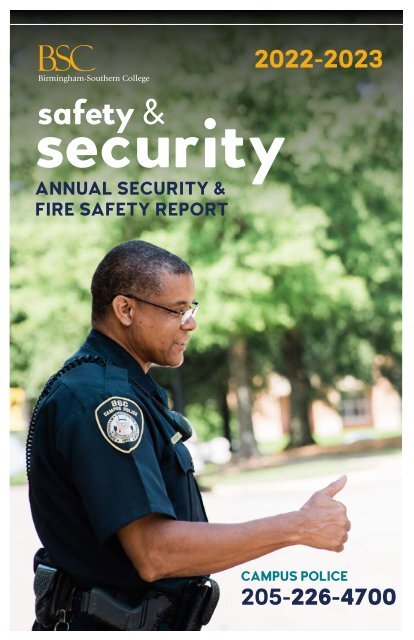

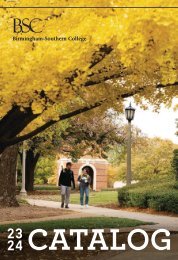
![2023-2024 BSC Catalog Updated_UG ONLY_FINAL[82]](https://img.yumpu.com/68414854/1/178x260/2023-2024-bsc-catalog-updated-ug-only-final82.jpg?quality=85)
